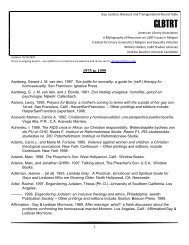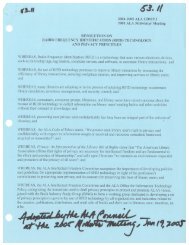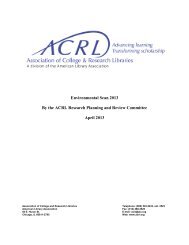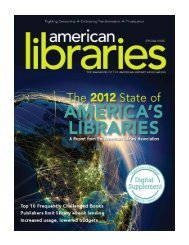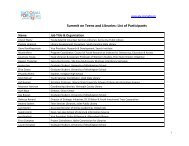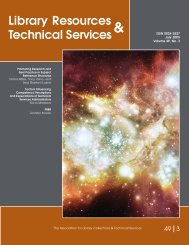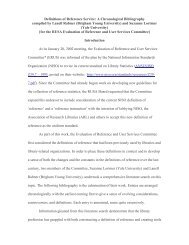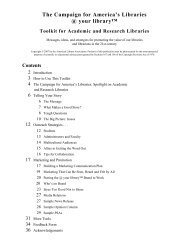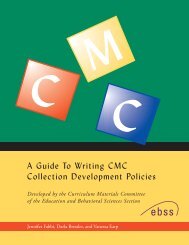Toolkit for School Library Media Programs - American Library ...
Toolkit for School Library Media Programs - American Library ...
Toolkit for School Library Media Programs - American Library ...
You also want an ePaper? Increase the reach of your titles
YUMPU automatically turns print PDFs into web optimized ePapers that Google loves.
Sample Oped<br />
Support—don’t cut—school library<br />
media program<br />
One of our most important educational resources is also<br />
one of its least valued —the school library media center.<br />
This is un<strong>for</strong>tunate. When money is tight, tough<br />
decisions have to be made, and they are not always<br />
good decisions. The pattern in many school districts has<br />
been to cut school library media programs first, when<br />
they should be last.<br />
A growing body of research confirms that this is a<br />
mistake.<br />
Research conducted in eight states shows a direct link<br />
between good school libraries and student<br />
achievement. These studies, conducted by researcher<br />
Keith Curry Lance, Ph.D., of the <strong>Library</strong> Research<br />
Service in Denver, found that students at schools with<br />
libraries that are well stocked, well staffed and wellfunded<br />
consistently score from 10 to 18 percent higher<br />
on reading and other tests. This is true whether the<br />
schools and their communities are rich or poor, and<br />
whether the adults in them are well or poorly educated.<br />
In Williams Intermediate <strong>School</strong> in Davenport, Iowa, <strong>for</strong><br />
example, library use increased dramatically during the<br />
2000–01 school year following a revitalization of the<br />
library. So did reading scores. Of the 6th graders tested,<br />
18 percent moved from needing improvement to<br />
meeting or exceeding reading standards. Test scores <strong>for</strong><br />
Black and Hispanic students showed even greater gains.<br />
[Add statistics or examples of how your media center<br />
makes a difference.]<br />
Think about it. Reading is fundamental to all kinds of<br />
learning. Students who read more, read better.<br />
Students who can read better, learn better. Students<br />
read and learn more if they have a ready supply of<br />
quality resources and a knowledgeable guide.<br />
The fact that these truths appear self-evident may<br />
explain in part why they have been so often overlooked.<br />
There also has been a tendency among many educators—<br />
21<br />
nurtured in part by the technology industry—to believe<br />
that putting computers in every classroom is the<br />
answer to both learning and spending deficits.<br />
That clearly has not been the case. And the myth that<br />
school library media centers would no longer be<br />
needed has turned out to be just that—a myth.<br />
Good school library media centers, as defined by Lance,<br />
are stocked with a full complement of print and<br />
electronic resources and staffed by media specialists<br />
with advanced education degrees in teaching and<br />
in<strong>for</strong>mation science. They are a far cry from what most<br />
parents remember.<br />
Contrary to what many think, having computers both<br />
in the classroom and at home does not mean students<br />
have everything they need to learn. Instead, what it<br />
often means is that students have developed a false<br />
sense that research means doing an Internet search,<br />
along with an unhealthy aptitude <strong>for</strong> plagiarizing thanks<br />
to “cut and paste.”<br />
In an increasingly complex in<strong>for</strong>mation environment,<br />
knowing how to find in<strong>for</strong>mation using a variety of<br />
sources, how to evaluate it and apply it in an ethical<br />
manner is crucial.<br />
<strong>School</strong> library media specialists teach students the 21st<br />
century research skills they will need to learn and<br />
achieve in school and throughout their lives. They also<br />
work with teaching staff to develop projects and assignments<br />
that take students beyond the Web. As wonderful<br />
as the Internet is, the vast majority of human knowledge<br />
is still contained between two covers.<br />
Savvy educators and parents understand that students<br />
need a full range of resources to explore the world of<br />
ideas and in<strong>for</strong>mation. They know there is no such<br />
thing as good education without good libraries and<br />
that investing in library media programs simply makes<br />
good sense. Cutting school libraries is not the answer.<br />
Supporting them is.<br />
####



